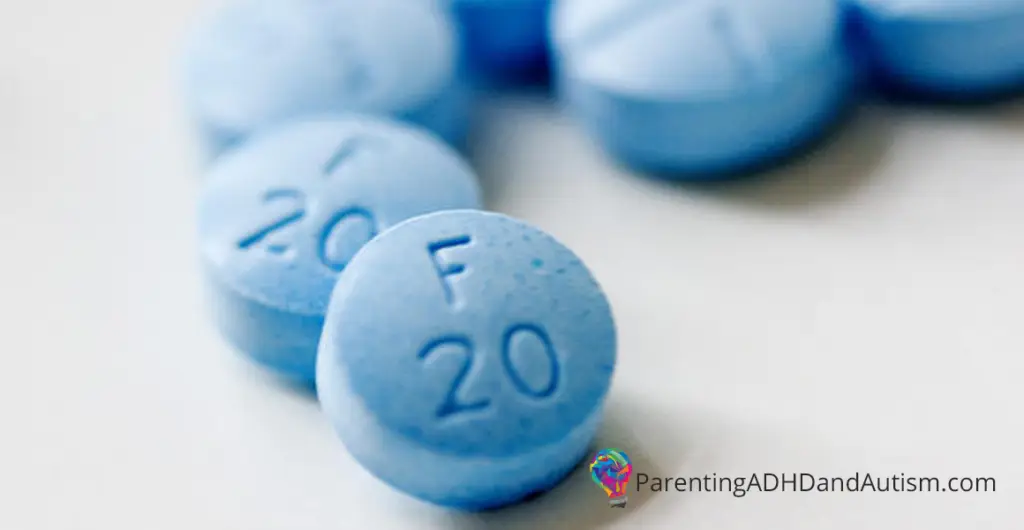NOTE: I am not a physician or a psych. I'm simply a mom sharing the experience and knowledge I've gained on ADHD medications over the years. Please discuss all medication issues and questions with your child's doctor. Don't act on any information in this article without your doctor's consent.
There's a lot more to ADHD.
This is the third entry in my series: “All the Other Stuff they Don't Tell You.” I devoted nearly an entire chapter to all the parts of ADHD that doctors, therapists, and teachers don’t tell parents about upon diagnosis, or sometimes ever, in my latest book, The Insider’s Guide to ADHD: Adults with ADHD Reveal the Secret to Parenting Kids with ADHD. There’s inflexibility, meltdowns, sensory processing struggles, executive functioning deficits, MTHFR, etc. That inspired this series of articles. Today I’m going to discuss something very confounding, but equally important for kids with ADHD and/or autism: MEDICATION.
ADHD/Stimulant Medication: The Basics
Did you know there's more than one type of stimulant — the medication used most often to treat ADHD? All stimulants are not created equal, although their function is the same — to increase focus and decrease impulsivity in kids with ADHD.
Two types/classes of stimulant:
- methylpehnidate (Ritalin, Concerta, Daytrana, Quillivant…)
- amphetamines (Vyvanse, Adderall, Evekeo…)
Now, I consider the dex derivatives kind of their own category, although they're lumped in with methylphenidate or amphetamine, whichever the dex is paired with in that specific medication. For instance, Focalin is a dexmethylphenidate and Dexedrine is a dextroamphetamine. I pull the dex- meds out in their own category because they are different. For instance, my son cannot take amphetamines at all (causes aggression and extreme mood changes), but he did well on Dexedrine. He also does well on methylphenidates. However, he had a severe reaction to Focalin, a dexmethylphenidate, despite doing well on methylphenidates alone and dexedrine alone. This is indicative of just how complex ADHD medication can be.
Here's a list of ADHD medications, by type, although it hasn't been updated this year to include new medications, like Evekeo: ADHD MEDICATION CHART. (Evekeo is 50% amphetamine and 50% dexamphetamine — Adderall is 75%/25%.)
Most individuals with ADHD do well on one type or the other, but not both. That tidbit offers some great direction! If your child has bad side effects on one medication, try something from the other class next — a different type altogether.
ADHD/Stimulant Medication: Getting it Right
Giving your child ADHD medication is not like giving them Tylenol for a headache. There is no way to know what dosage is required for your child, other than to try it. The reason is that the most effective stimulant dosage is dependent on that individual's neurotransmitter levels, metabolism, and genetics. A 300-pound man could need only the lowest dose of stimulant, while a 50-pound first grader could need the maximum dose. The only ADHD medication dosed by size is the non-stimulant Intuniv.
The best standard of care for ADHD medication is to start on the lowest dose, and increase slowly, only as needed. If your doctor tries to start on a higher dose, or they give you a schedule of dosage increases right when they write the prescription, they are not following the standard of care for ADHD. That could signal that it's time to find a different doctor to manage your child's ADHD.
Doctors often don't tell parents ADHD symptoms and behavior could get worse before they get better when starting medication. If the dose is too low, behavior could actually deteriorate, contrary to common sense. If the lowest dose increases negative behavior and ADHD symptoms, it's wise to try a dosage increase before changing the medication altogether.
People often think that choosing to try medication for ADHD automatically means you have to accept nasty side effects. That simply isn't true. Side effects for ADHD medications are greatly decreased with the right medication and dosage for that individual. And many side effects can be addressed when the medication is helping a great deal. If your child is like a “zombie” or moody and aggressive when they weren't before, that means it's the wrong medication and/or the wrong dosage. ADHD medication is not meant to dope a child into submission, or change their personality. If it does, it's wrong.
ADHD/Stimulant Medication: A tool, not a cure
There is no cure for ADHD. Therefore, ADHD medication is not going to cure or “fix” your child's ADHD.
Rather, it's one tool in a complex treatment plan. Medication alone is somewhat helpful, but only when it is taken. There are no lasting effects from ADHD medication. That means, there has to be more to treatment than just medication.
As the saying goes, “Pills don't teach skills.” It's important to also have therapy and behavior modification. In fact, the combination of medication and therapy is the recommended ADHD treatment by the American Academy of Pediatrics, based on a large study that found the combination the most effective treatment for ADHD.
Medication can slow a child down enough that they can be available to learn skills and coping strategies to manage ADHD.
ADHD/Stimulant Medication: No comparison
Every individual reacts differently to each medication. For instance, my son cannot take Vyvanse or Adderall without significant and intolerable side effects. However, I know a lot of children who do phenomenally well on these same medications. Since efficacy of medication depends on an individual's neurotransmitter needs, metabolism, and genetics, results are very individual. Don't worry about what works or didn't work for your friend's child, or even my child; that doesn't mean anything at all for your child.





I agree with you ????. I am in my late 40s and I have been diagnosed 7 years ago. Does not take's only medication for me, to benefit from it but Education about the condition also, and a right medication, and a right dose, as well the good combination of them, special when Anxiety and Depression are present. And unfortunately they are together. But what I love about us, is that we do not give up easy. It was hard for me when I was diagnosed, because I want to suppress the condition, and not to embrace, however with terrapy, I am triving.I read books, I am getting Educated on what helps and what does not. And in your article you write it correctly, even if there are one thousand of us, we are individual and there are not “one size fits us all”. But I am very, very thankful to live in USA and get the best help regarding this condition. Keep up the good work, we need you.
It definitely takes a combination of treatment modalities to treat ADHD successfully — it's very complex.
Do you know if there are people who are diagnosed with ADHD and Anxiety+ Depression are not present? I will like to know if that is the case. Thank you.
I'm not following your question. People can definitely have anxiety and/or depression with ADHD. It's quite common. But you can also just have ADHD with nothing else.
Why are Teachers not more understanding to kids with ADHD ?
They just aren't educated on it. They can't know what they don't know. Teachers aren't required to learn anything about special learning needs to become a gen ed teacher, sadly.
I have a child that was diagnosed with ADHD and Autistic tendencies, not really sure what all that means. She was on Methaphenadate and Chlonadine. The teachers were getting to the point where they would ask if I gave her her pill. I pulled her out of school to homeschool, and have actually taken her off the meds. She was getting antagonist and not really listening anyway. She has done much better at home. I was wondering what your thoughts were on marijuana. I was looking for a better approach for her. The weed was for the inability to sleep well. I can lie her down at 8:30 and her not fall asleep until 11. With good rest I think a lot of issue would resolve themselves. We have tried baths, sleepy tea, melatonin, the non habit sleep aid.
I cannot answer to marijuana and its effects on ADHD. However, we use CBD oil (hemp, no THC). We use it mostly for anxiety, but find it can help with sleep.